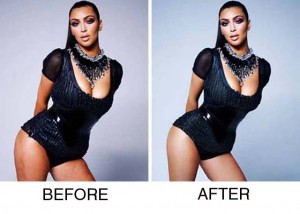New Software Revealing Photoshopped Images; Likely Lawsuits Against Publishers
Finally, the world will be getting technology to show us just how gross-looking Kim Kardashian really is.
 A couple of computer scientists over at the Dartmouth College’s Department of Science have developed software that will measure how much photographs have been digitally altered, or as the cool kids say “Photoshopped.” The developers, Eric Kee and Hany Farid, say the software is capable of analyzing the geometric and photometric changes in a picture and then assign a number rating that correlates with the level of Photoshopping that has occurred. You can take a look at the software tool in action here. The before and after shots range from startling to downright disturbing – especially the ones featuring Kim Kardashian and Kim Cattrall, woof.
A couple of computer scientists over at the Dartmouth College’s Department of Science have developed software that will measure how much photographs have been digitally altered, or as the cool kids say “Photoshopped.” The developers, Eric Kee and Hany Farid, say the software is capable of analyzing the geometric and photometric changes in a picture and then assign a number rating that correlates with the level of Photoshopping that has occurred. You can take a look at the software tool in action here. The before and after shots range from startling to downright disturbing – especially the ones featuring Kim Kardashian and Kim Cattrall, woof.
Now aside from the software being a cool novelty and gossip magazine news article-generating machine, there are some serious and practical applications for it. Chief among them is its ability to combat the growing low self-esteem and personal image issues plaguing today’s youths and adults. For years, magazine gawkers have been killing themselves to attain the unattainable beauty filling every page of today’s periodicals, all the while never knowing the true extent of each picture’s falsities. And in all honesty, I’d like to say I was never fooled by these sorts of images, but as I later learned after the proliferation of high-definition television I was right in line with the rest of the sheep. I mean, who would’ve guessed that the only thing needed to reveal all the wrinkles and blemishes on television was an extra 240 pixels?
But I think another more interesting and potentially more lucrative use for the software comes to play in the field of new venues for lawsuits. For years, people have criticized the fashion and media industries for putting out digitally altered pictures. These critics argue that the images damage the self-esteem of viewers by causing them physical and emotional distress. The problem has always been getting concrete data as to the extent of the damage these sorts of images can cause to a person. This software could serve as an important step for other researchers to draw further correlations between the level of digital alterations in photos and the amount of distress they’ve caused to people. This data in turn can then be used as possible evidence in lawsuits against publishers. As crazy as all this might sound, many countries, such as Norway and France, currently have legislation pending in their respective governments that would require publishers to include warning labels telling viewers that a photo has been digitally altered. So don’t be surprised if you see similar bills popping up on our side of the pond.
Furthermore, the software tool could also be used as a scientifically-based method to assist plaintiffs in calculating the amount of compensatory damages they should receive in any potential lawsuits based on Photoshopped images. Calculating damages is always a difficult and long process. Our country’s legal system is one that requires plaintiffs to not only show the harm they’ve suffered, but also the amount of monetary damages that stems from it. It’s through this way that court awards can be justified as fair, because not having such a system in place could potentially lead to awards that are wildly out of sync with a plaintiff’s initial harm. A rating system for digitally altered photos would do wonders in helping to provide some firm numbers on a plaintiff’s pain and suffering.
So what do you guys out there think about Dartmouth College’s latest computer experiment? Do you think digitally altered images are really all that bad for society or is this another case of people with too much time on their hands?


Comments